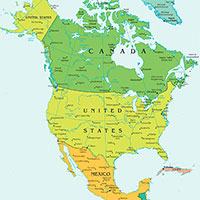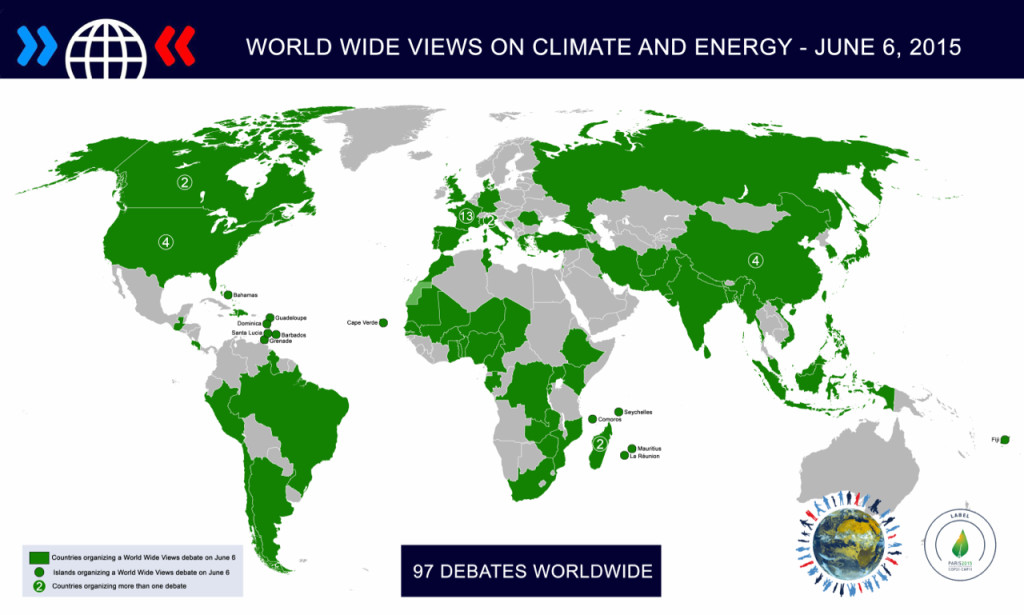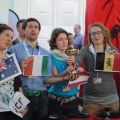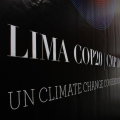10,000 people gathered across 79 countries to partake in the World Wide Views on Climate Change and Energy event. After going through a booklet and some videos on climate change, the participants spent a day debating climate science, policy, and governance of all levels. The participants were selected to reflect the demographics of each country in which the event was taking place.
At the end of each session the participants recorded their opinions by voting on different topics. But Bjørn Bedsted, the event’s global coordinator, explained that the project was more than just a poll:
“World Wide Views is not a campaign. It is not about telling citizens what they should think, but about asking them what they do think. It is not a poll, it is not a survey, it is more than that. It is citizen consultation”.
The importance of these consultations to the negotiations were explained by Christiana Figueres, the executive secretary of the United Nations Framework Convention on Climate Change (UNFCCC), in a press statement. She said: “Bringing forward the views and the voices of citizens from across the globe can only contribute to a positive new universal climate agreement in Paris in December”.
The results were released during the recent UN climate negotiations in Bonn, Germany to an audience of both government representatives and civil society. Figueres noted that one of the significant takeaways is the universal support for action, stating it is a “myth” that there is an absence of public support.
Governments around the world are also preparing their commitments and strategies for the Paris conference, and will be looking at this project for insights into their domestic population’s desire for action.
What were some of the other findings?
The UN negotiations are not doing enough
Some of the questions were directly related to the UN process and will give negotiators plenty to think about. The participants did not look favourably on the work done so far by the UN negotiations, with over 70 per cent responding that the outcomes from the UN negotiations have not done enough to fight climate change. On a more positive note for the UN process, a near equal amount, 70 per cent, also believe that tackling climate change is a global responsibility that should be tackled through an international agreement or treaty.
The results signal a desire for greater ambition at the December Paris negotiations, where nations will finalise an international climate agreement. Almost two thirds of participants supported doing whatever it takes to limit warming to 2°C. The 2°C target has been internationally agreed to at past negotiations, but scientists around the world have warned that we are currently on a path to exceed that limit.
There needs to be more money for climate finance
Participants were equally as ambitious when talking about climate finance issues. When asked about post-2020 funding for adaptation and mitigation, 78.5 per cent of the participants believe that high-income nations should pledge more than the current promise of US$100 billion by 2020. Support dropped to 68.4 per cent when only looking at developed country results, which is still significant.
Consensus on another big financial issue, loss and damage, was harder to find. Participants widely believed that something should be done to address the damages done as a result of the impacts of climate change, but were split between creating a new fund, implementing plans to reduce damages, and creating new institutions such as an international climate court.
One proposal that also received support was to create a new group of countries, outside the current binary of developed and developing countries, for developing countries that have become economically powerful, such as China and South Africa.
National leadership is wanted
Outside of the UN negotiations, governments should take note that 80.5 per cent of participants believe that climate change should be a national priority. And 79 per cent also believe that governments should take action even if other countries do not.
A hot domestic issue in many countries is the implementation of a carbon tax. Only 9.4 per cent of participants outright opposed a carbon tax, while 41.3 per cent supported a carbon tax that was implemented across the world and had increasing cost for countries that did not reduce their emissions.
Strong support for phasing out fossil fuels
The recent G7 announcement to phase out fossil fuel emissions by the end of the century also found global support. Over two thirds of participants wanted a legally binding commitment to reach zero emissions by the end of the century as part of the Paris deal. An additional 17.5 per cent supported legally binding commitments for developed and emerging nations.
Participants also sent a message to fossil fuel companies, like Shell as it embarks on drilling in the Arctic, that more exploration is not necessary. Only 22.8 per cent of the participants believe that we should continue to look for new fossil fuel reserves. Exploration for new coal reserves had the highest opposition, with 62.3 per cent saying it should be stopped. A smaller percentage, 45.1 per cent believe that all fossil fuel exploration should be stopped.
The strong consensus on action that was found in these consultations will contribute to the momentum that is being built in the lead up to Paris. The large support for keeping warming below 2°C will help push the ambition in the agreement. Governments should note the clear demand for more leadership from them, even if the UN process is unsuccessful, and that leadership encompasses mitigation commitments as well as finance pledges and adaptation support. These results also show fossil fuel companies who have plans to continue growing their reserves and public support for their activities is shrinking.
This projects was launched by a partnership between the UNFCCC secretariat, the French National Commission for Public Debate (FR), the Danish Board of Technology Foundation (DK) and Missions Publiques (FR). It also had the support of the French Government, which is hosting the major climate negotiation in Paris at the end of this year.
The full results as well as the documents and videos presented to the participants can all be found on the World Wide Views on Climate Change and Energy site.














comment